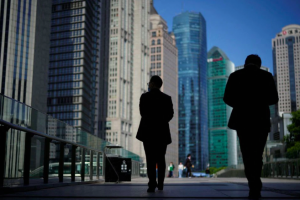The increase in China’s COVID has struck trading floors in Beijing and the banking hub in Shanghai.
Last week, the average daily trading volume of yuan and dollars on China’s interbank market dropped to approximately $20 billion.

COVID-19 is quickly spreading throughout Shanghai’s financial district and Beijing’s trading floors, slowing down already sparse trading and causing regulators to postpone a weekly meeting to review public share transactions.
The measures put forth to address earlier COVID crises have been revived by several banks and asset managers, adding another another layer of volatility to the currency and stock markets, where the outlook is clouded by a difficult exit from stringent health curbs.
The abrupt abandonment of its zero-COVID policy earlier this month caused bulk testing to be suspended, and as a result, official figures no longer dependably catch new case numbers. More than half of their staff in Beijing, the epicentre of the viral epidemic, have tested positive, according to internal polls conducted by several large asset managers and banks.
A fund manager at PICC Asset Management, who declined to be identified because he is not authorised to speak to the media, stated that more over half of his colleagues in Beijing are sick, as opposed to 5% to 10% in Shanghai.
Last week saw the lowest average daily yuan/dollar trading volume in China’s interbank market since April 2022, when Shanghai was put under a harsh two-month lockdown to stop the virus’s spread.
Last week’s stock trading volume also decreased. The Shanghai Composite’s (.SSEC) weekly total of 139 billion shares traded was a little below than the 143 billion average for the previous three years.
A trader at a state-owned institution who spoke on the condition of anonymity because they were not authorised to discuss such topics with the media noted that since the majority of currency dealers in Beijing are not present in their workplaces, “trading volume will naturally reduce.”
Any employee who lives with someone who has a fever or tested positive has been asked by the bank not to come into the workplace. The trader explained that remote trading doesn’t deal with the issue of being sick in bed and having to take care of your family as well.
Disruption
Initial public offers (IPOs) are also being impacted by the pandemic, with the China Securities Regulatory Commission cancelling a weekly meeting last week to review them. If the meeting will resume this week is unclear.
A news conference intended to discuss the economic data for November was likewise cancelled by the National Bureau of Statistics.
Undoubtedly, a number of organisations are prepared to endure disruption thanks to years of tight COVID regulations.
One banker at Shanghai-based Haitong Securities, who spoke on the condition of anonymity, said, “We travel a lot, and we have several people working on one IPO project, so we take turns doing the task if one banker is on sick leave.”
Nevertheless, once the virus starts to spread widely, the predicament that lies ahead is unprecedented.
A senior trader at a Chinese bank in Shanghai stated, “We have a backup and recovery disaster plan and revived backup offices in two locations much like how we did during Shanghai lockdown in April and May.”
The situation is expected to be at its worst since the first half of 2020, so we are doing everything we can.










































